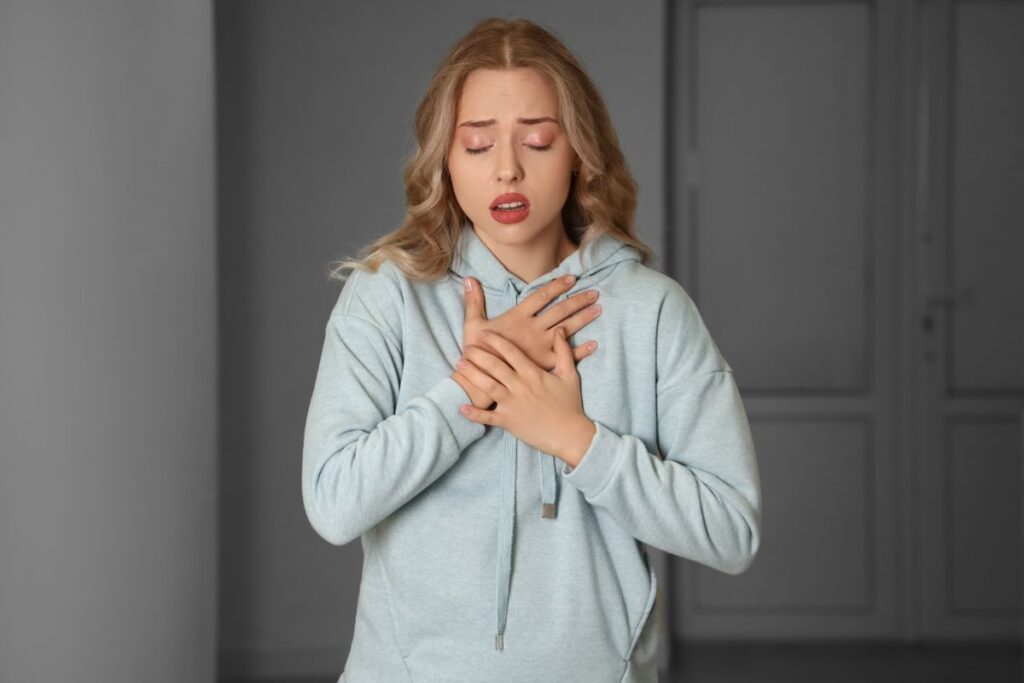Home » Treatment for Teens » Teen Anxiety Treatment » Teen Panic Disorder
Panic Attacks in Teens
Panic disorders can cause panic attacks in teens. Our treatment programs can help your teen develop coping skills to prevent and overcome panic attacks.
Contact Hillcrest Adolescent Treatment Center today to learn more.
Home » Treatment for Teens » Teen Anxiety Treatment » Teen Panic Disorder
Panic disorders can cause panic attacks in teens. Our treatment programs can help your teen develop coping skills to prevent and overcome panic attacks.
Contact Hillcrest Adolescent Treatment Center today to learn more.

Hillcrest Adolescent Treatment Center offers a safe and supportive environment where teens struggling with panic attacks can find the care they need to recover and thrive. Specializing in comprehensive inpatient treatment for adolescents aged 12-18, Hillcrest’s dedicated team prioritizes the mental, physical, and social well-being of each teen. By working closely with teens and their families, Hillcrest fosters a collaborative approach to recovery, empowering young people to regain control over their lives.
Contact us today to learn more about our teen mental health treatment centers.
3 Types of Panic Attacks in Teenagers
Panic attacks in teens can manifest in various ways, influenced by triggers and individual experiences. Each type has unique characteristics, and understanding them is crucial for effectively addressing your teen’s needs.
Understanding these distinct types of panic attacks can help parents and caregivers identify patterns and seek the appropriate treatment to support their teen. At Hillcrest Adolescent Treatment Center, our approach is tailored to address these unique challenges, providing teens with the tools they need to regain control and confidence.
#1.
Spontaneous
(Unexpected)
Panic Attacks
These panic attacks occur seemingly out of nowhere, without any identifiable trigger. Teens who experience spontaneous panic attacks often feel confused and frightened, as they cannot predict when or why the attacks might happen. This unpredictability can lead to increased anxiety, as teens may start to worry about having another attack. Spontaneous panic attacks are common in individuals with panic disorder and can disrupt daily life.
#2.
Situational
Panic
Attacks
Situational panic attacks are directly tied to specific circumstances or environments. For teens, these might include attending school, public speaking, or participating in social events. The anticipation of facing these situations can create overwhelming stress, leading to a panic attack. Teens with underlying social anxiety or phobias are particularly susceptible to situational panic attacks, which can result in avoidance behaviors that impact their social and academic lives.
#3.
Anticipatory
Panic
Attacks
Anticipatory panic attacks stem from the fear of having a panic attack in a particular situation. For instance, a teen who has experienced a panic attack during a test may begin to fear all testing situations, leading to heightened anxiety long before the actual event. This fear often creates a vicious cycle, as the stress of anticipation can trigger the very panic attack the teen was trying to avoid. Over time, this pattern can lead to a significant reduction in a teen’s quality of life.
Causes of Panic Attacks in Teens
Panic attacks don’t occur in isolation; they often stem from a combination of factors. Pinpointing the root causes is crucial for effective treatment.
Common causes include:
- Genetics: Teens with a family history of anxiety or panic disorders are more susceptible.
- Stress: Academic pressure, peer relationships, and family conflicts can act as significant stressors.
- Trauma: Experiencing or witnessing a traumatic event can trigger panic attacks.
- Chemical Imbalances: An imbalance in neurotransmitters like serotonin or dopamine may contribute to panic attacks.
- Underlying Mental Health Conditions: Disorders such as generalized anxiety disorder (GAD), depression, or post-traumatic stress disorder (PTSD) can co-occur with panic attacks.
Causes of Panic Attacks in Teens
Panic attacks don’t occur in isolation; they often stem from a combination of factors. Pinpointing the root causes is crucial for effective treatment.
Common causes include:
- Genetics: Teens with a family history of anxiety or panic disorders are more susceptible.
- Stress: Academic pressure, peer relationships, and family conflicts can act as significant stressors.
- Trauma: Experiencing or witnessing a traumatic event can trigger panic attacks.
- Chemical Imbalances: An imbalance in neurotransmitters like serotonin or dopamine may contribute to panic attacks.
- Underlying Mental Health Conditions: Disorders such as generalized anxiety disorder (GAD), depression, or post-traumatic stress disorder (PTSD) can co-occur with panic attacks.

Signs and Symptoms of a Panic Attack in a Teenager
Recognizing a panic attack is the first step in seeking help. Teens may exhibit a range of physical and emotional symptoms. If your teen frequently experiences these symptoms, it may be time to seek professional intervention.
- Rapid heartbeat or palpitations
- Sweating, trembling, or shaking
- Shortness of breath or hyperventilation
- Chest pain or discomfort
- Nausea or dizziness
- Chills or hot flashes
- Fear of losing control or going crazy
- Feeling detached from reality (derealization)
Signs and Symptoms of a Panic Attack in a Teenager
Recognizing a panic attack is the first step in seeking help. Teens may exhibit a range of physical and emotional symptoms. If your teen frequently experiences these symptoms, it may be time to seek professional intervention.
- Rapid heartbeat or palpitations
- Sweating, trembling, or shaking
- Shortness of breath or hyperventilation
- Chest pain or discomfort
- Nausea or dizziness
- Chills or hot flashes
- Fear of losing control or going crazy
- Feeling detached from reality (derealization)

How Do I Know My Teen Needs Mental Health Treatment?
Panic attacks can significantly disrupt a teen’s daily life, affecting their emotional well-being, relationships, and ability to thrive academically or socially. It’s not always easy to determine when your teen’s struggles go beyond normal stress or anxiety and require professional intervention. However, certain signs can indicate that mental health treatment may be necessary.
- Avoidance Behaviors: If your teen is avoiding specific situations, places, or activities for fear of triggering a panic attack—such as refusing to attend school, skipping social events, or withdrawing from family activities—this could signal a need for professional help.
- Academic or Social Challenges: Anxiety related to panic attacks may cause your teen’s grades to drop or result in conflicts with peers. They may isolate themselves, avoiding friends or extracurricular activities they once enjoyed.
- Expressions of Hopelessness or Fear: Teens struggling with panic attacks often feel overwhelmed by their symptoms. They may voice feelings of hopelessness, despair, or fear about their ability to function normally, which can be deeply distressing for them and their family.
- Worsening Physical Health: Chronic stress from frequent panic attacks can lead to physical symptoms like headaches, stomach issues, fatigue, or weakened immunity. These physical health concerns may be linked to untreated anxiety or panic disorder.
- Ineffective Coping Strategies: If your teen has tried self-help techniques or coping strategies, such as breathing exercises or relaxation methods, but still struggles to manage their symptoms, professional treatment may be necessary to address the underlying causes.
Ignoring these signs or delaying treatment can lead to more severe consequences, such as the development of additional mental health disorders or a reduced quality of life. Early intervention is key to preventing the escalation of panic attacks and helping your teen regain control and confidence.
Diagnosing Panic Disorder in Adolescents
Diagnosing panic disorder in teens requires a thorough evaluation by mental health professionals. Proper diagnosis ensures that teens receive targeted, evidence-based care tailored to their specific needs.
At Hillcrest, this process involves:
- Comprehensive Assessments: Teens undergo physical exams to rule out medical causes for their symptoms.
- Psychological Evaluations: Licensed therapists assess the teen’s mental health history, stressors, and symptom patterns.
- Collaboration with Families: Input from parents and caregivers helps create a full picture of the teen’s challenges.
How Is Teen Panic Disorder Treated?
Hillcrest Adolescent Treatment Center offers a multi-faceted and comprehensive approach to treating panic disorder in teens, focusing on their mental, physical, and emotional well-being. Each treatment plan is tailored to meet the individual needs of the teen, utilizing a wide range of evidence-based therapies and experiential services.
- Behavioral Therapy: This approach helps teens identify and modify behaviors associated with their panic attacks, enabling them to respond to triggers in healthier ways.
- Psychodynamic Therapy: A deeper exploration of subconscious thoughts and emotions helps uncover unresolved issues that may contribute to panic attacks, fostering greater self-awareness.
- Interpersonal Therapy: By addressing relationship dynamics and improving communication skills, this therapy helps teens build supportive connections that reduce stress and anxiety.
- Family Therapy: Strengthening family relationships and fostering open communication are key components of recovery. This therapy ensures families are equipped to provide a nurturing environment for their teen.
- Personal Development: Hillcrest focuses on helping teens build self-confidence, develop emotional resilience, and establish a stronger sense of identity, which can reduce anxiety and fear.
- Recovery Management Therapy: Teens are taught practical skills for maintaining their progress and preventing relapse, emphasizing long-term recovery strategies.
- Expressive Therapy: Creative outlets such as art, music, or writing provide teens with alternative ways to process and express their emotions, helping them release tension and improve self-expression.
- Outdoor Therapy: Nature-based activities encourage relaxation, mindfulness, and stress relief, allowing teens to reconnect with themselves and their environment in a therapeutic setting.
Why Hillcrest Adolescent?
At Hillcrest Adolescent Treatment Center, we recognize that every teen is unique, requiring personalized care that addresses their specific challenges and needs. Our commitment to compassionate, evidence-based treatment has made us a trusted choice for families seeking help for their teens.
Hillcrest offers multiple levels of care to ensure each teen receives the appropriate support for their recovery journey:
- Residential Treatment: For teens requiring intensive, round-the-clock care, our residential program provides a structured and nurturing environment where they can focus entirely on healing. This level of care includes individualized therapy, group sessions, and experiential treatments to foster comprehensive recovery.
- Partial Hospitalization Program (PHP): Designed for teens who need structured, day-long support while transitioning toward greater independence, our PHP offers a robust schedule of therapy and activities. Teens in this program return home or to supportive housing in the evenings, allowing them to practice new skills in a real-world setting.
Hillcrest’s programs are built on a foundation of excellence:
- Expert Staff: Our team of licensed therapists, psychiatrists, and mental health professionals are highly experienced in adolescent mental health, ensuring each teen receives expert care.
- Family-Centered Approach: We actively involve families in the recovery process, helping to build stronger relationships, foster understanding, and promote long-term success.
- Focus on Holistic Wellness: Beyond addressing mental health symptoms, our programs prioritize the mental, physical, and social well-being of each teen, encouraging their growth in every aspect of life.
Get Help for Panic Disorder Today
If your teen is struggling with panic attacks, Hillcrest Adolescent Treatment Center is here to help. Our specialized programs are designed to meet the unique needs of adolescents, providing the support they need to overcome challenges and build a brighter future.
Contact us today to learn more about our treatment options or to schedule a consultation. Recovery starts with a single step—let us help your teen take it.












